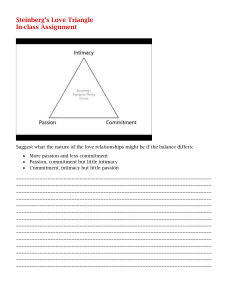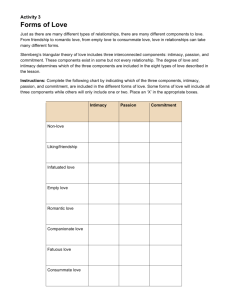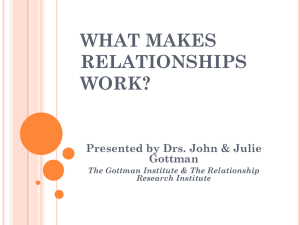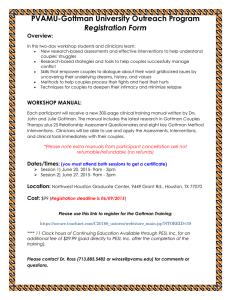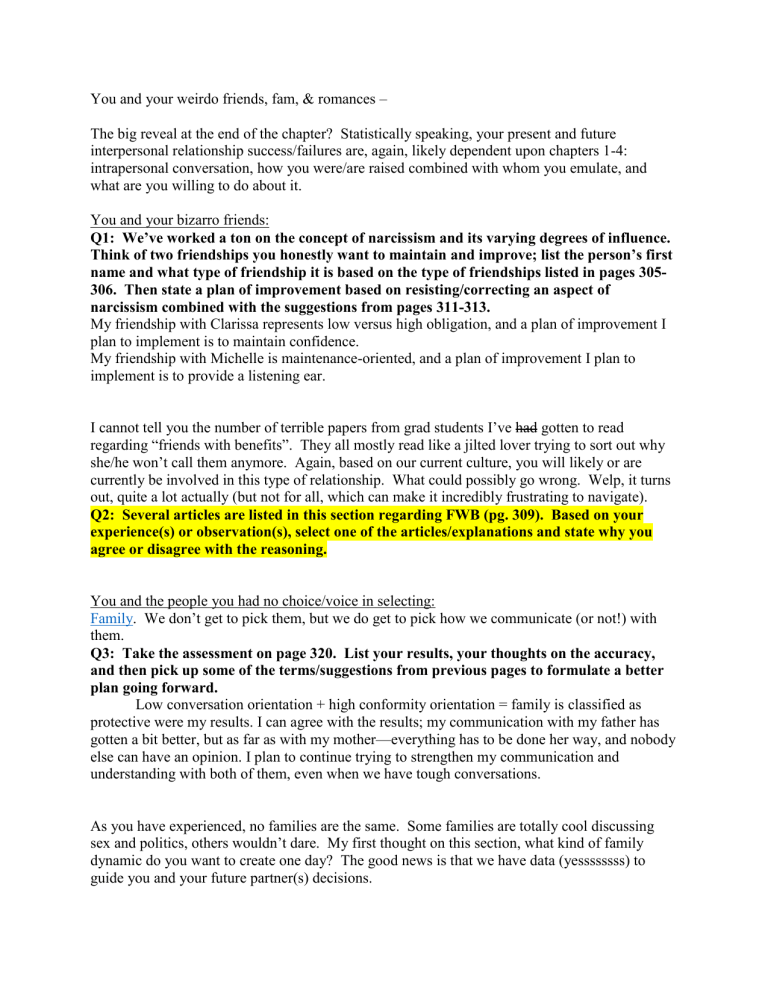
You and your weirdo friends, fam, & romances – The big reveal at the end of the chapter? Statistically speaking, your present and future interpersonal relationship success/failures are, again, likely dependent upon chapters 1-4: intrapersonal conversation, how you were/are raised combined with whom you emulate, and what are you willing to do about it. You and your bizarro friends: Q1: We’ve worked a ton on the concept of narcissism and its varying degrees of influence. Think of two friendships you honestly want to maintain and improve; list the person’s first name and what type of friendship it is based on the type of friendships listed in pages 305306. Then state a plan of improvement based on resisting/correcting an aspect of narcissism combined with the suggestions from pages 311-313. My friendship with Clarissa represents low versus high obligation, and a plan of improvement I plan to implement is to maintain confidence. My friendship with Michelle is maintenance-oriented, and a plan of improvement I plan to implement is to provide a listening ear. I cannot tell you the number of terrible papers from grad students I’ve had gotten to read regarding “friends with benefits”. They all mostly read like a jilted lover trying to sort out why she/he won’t call them anymore. Again, based on our current culture, you will likely or are currently be involved in this type of relationship. What could possibly go wrong. Welp, it turns out, quite a lot actually (but not for all, which can make it incredibly frustrating to navigate). Q2: Several articles are listed in this section regarding FWB (pg. 309). Based on your experience(s) or observation(s), select one of the articles/explanations and state why you agree or disagree with the reasoning. You and the people you had no choice/voice in selecting: Family. We don’t get to pick them, but we do get to pick how we communicate (or not!) with them. Q3: Take the assessment on page 320. List your results, your thoughts on the accuracy, and then pick up some of the terms/suggestions from previous pages to formulate a better plan going forward. Low conversation orientation + high conformity orientation = family is classified as protective were my results. I can agree with the results; my communication with my father has gotten a bit better, but as far as with my mother—everything has to be done her way, and nobody else can have an opinion. I plan to continue trying to strengthen my communication and understanding with both of them, even when we have tough conversations. As you have experienced, no families are the same. Some families are totally cool discussing sex and politics, others wouldn’t dare. My first thought on this section, what kind of family dynamic do you want to create one day? The good news is that we have data (yessssssss) to guide you and your future partner(s) decisions. Q4: Based on the concepts in pages 319-324, design your future family communication dynamic. Be specific – state your reasoning behind the selections. You and the person you’re totally going to love forever in fact the love is just going to grow each day and never fade EVER: I mean it, from this day forward if you have the intrapersonal desire to just get better and pick better partners, get with Gottman. John or Julie. Their work is practical yet based in science. As long as you have willing participants, great relationships can happen by following their work. Thinking about where the majority of you are now in your lives, you may be in a relationship, just out of one, not really into it, etc. There is 100% super helpful info in this section for wherever you might fall. Keep this in mind as you read through it: statistically speaking, relationships that occur before our brains are fully formed (~25ish) just aren’t really built to last. They certainly can – it’s just not as common. Now, if you are looking or eventually hope for a successful, long-term partner, take a peek at pages 324-328. I’m guessing several of you are familiar w/ Sternberg’s Triangular Theory of Love. Here’s the breakdown: Intimacy: Not strictly limited to a sexual connection. Think of intimacy as time/activities/conversations that are not available to others. This is the special connection that you are only going to share w/ your Person. For some couples, their most intimate moments occur when cooking a meal together; watching a specific show together; walking the dogs in the evenings, etc. Now, couples who report the highest levels of satisfaction w/ their partner absolutely have strong sexual intimacy as well (open communication of needs/wants/desires; affection/attention), it’s just not solely limited to this. Passion: Can definitely include attraction/sexuality but think of this more in terms of energy. Think of the infatuation stage you might have w/ someone, which is basically your brain begging for more info on this new person: are they “mysterious”, or did they crack you up, or did they irritate you a bit and now you need to know more. Passion is often your brain saying, “more more more”. And what happens when you get bored/don’t want to know more? The energy (passion) starts looking for the next thing to catch your eye/butterfly floating by. Commitment: Tricky. Misunderstood. Often the biggest reason for relational misery. I’m guessing you’ve seen it or lived it: couples who definitely love each other (we’re committed), but absolutely do not like each other. This is hell for everyone involved. A quote I love for this area: “Never confuse longevity for excellence.” Consider that please – just because something has lasted doesn’t mean it’s great and should be celebrated. A joyful commitment is so rare because it takes sacrifice. So, future-successful-relationship-person: what would you be willing to sacrifice or invest for your Person? Not begrudgingly, not as a pouty brat, not I’ll-do-this-butwill-also-hang-it-over-your-head-for-years; what will you willingly sacrifice for your Person? Would you move out of state away from your fam/friends b/c they got an amazing job offer? Would you pick up more work so they could go back to school? Would you take in one of their family members who needed help for an extended amount of time? And would you do one of these or a million other things for them and then never bring it up again as a source of leverage? That is commitment. Q4: You get to build your perfect relationship. Rank these previous three aspects in order of importance to you and provide specific reasons for your list. Finally, I’m not the biggest fan of the love languages theory/research. I think it can be helpful to figure them out in order to more fully connect, but we are such complicated creatures w/ varying degrees of needs w/ lots of different types of people. However, for the sake of Q5: go find what you believe your 1-2 love languages are for the relationships that matter AND THEN, cross compare these w/ Gottman’s Four Horseman of the Apocalypse. Basically, you are finding your strengths and weaknesses and finding a path forward.
